The Agenda 👇
Bloomberg columnist (and writer, and Twitter extraordinaire, and owner of rabbits) Noah Smith on Europe in the Entrepreneurial Age
Why investors shouldn’t shun Deliveroo, in Sifted
Software is eating the world, but can we facilitate its digestive capacities?
A business’s defensibility is what investors are most interested in
US tech companies have Delaware. But what’s Europe’s equivalent?
First of all, it’s now official: my wife Laetitia Vitaud and I have decided to merge our respective podcasts under one single brand, Building Bridges. From now on, we’ll take turns interviewing inspiring guests about the state of our fragmenting world. The resulting podcast will be syndicated across this newsletter, Laetitia’s own Laetitia@Work, and the Building Bridges hub on Substack.
🐰 Today, I’m pleased to share a new episode of Building Bridges in which I interview Noah Smith, an opinion columnist at Bloomberg and writer at Noahpinion, which I highly recommend subscribing to since it covers so many topics that resonate with this newsletter—from economic development to immigration to the current paradigm shift to industrial policy to economics in general.
My idea was to focus the conversation on Europe, and indeed Noah has many insights to share. One of them, which I find particularly compelling, is the idea of “optimal fragmentation”. There was a time, in the 19th century, when Europe actually benefited from being a fragmented continent. Britain, Germany and France were of roughly equal sizes; the world was the stage on which their rivalry played out; and the technology of the day made it so that each could grow their national industrial champions and claim to be part of the club of the more advanced countries.
Today, the situation in Europe is very different, however. The advanced technologies of the day (computing and networks) call for growing corporations whose scale far exceeds the size of any European market. And because they have realized fragmentation isn’t much of an advantage anymore, European countries have been trying to join forces under the umbrella of the European Union—alas encountering many frictions and obstacles along the way.
Here are the other topics I discussed with Noah:
The various places he’s lived, including Texas, Japan, New York, and the Bay Area—and what specifically attracted him to Japan, where he spent 5 years in total.
Industrial policy: what it is, why it is so difficult to design and implement during a paradigm shift, and how Europe has been performing on that front.
Texas and its (so far) failed attempts at catching up on Silicon Valley: it’s all about non-compete clauses, urban sprawling, and universities.
Where to look for inspiration: Noah shared his assessment of how various European countries are doing and what other regions in the world we should all study.
Finally, I made sure to ask Noah about his pet rabbits, and he shared the reasons why everyone should consider adopting their own—tl;dr, “they’re like clumsy, vegetarian cats”.
👉 Listen to my conversation with Noah using the player above 👆 or on Apple Podcasts or Spotify.
⚠️ While the European IPO market hasn’t necessarily been as hot as its US counterpart, one tech company has plans to go public as early as TODAY: Deliveroo. Unfortunately, it seems that investors are a bit skeptical, as the floatation is meeting strong headwinds.
I believe the bear cases against Deliveroo are a bit shortsighted, however. Just like Uber before it, investors will be well-served to remember that Deliveroo’s total addressable market isn’t restricted to food delivery, but instead the entire realm of things that people want delivered to them–both now and in the future.
And that’s not all; read the whole thing here: Deliveroo: Is It Worth It? 👀
💊 An Investment Thesis: Help Software Digest the World
For years, Marc Andreessen’s thesis about “software eating the world” was a solid one indeed–and in general, it still is. But for investors looking at the industries that are still early in the process of being eaten, it’s clear there are quite a few in which software alone can’t finish the job. In ‘hard’ industries that are heavily tangible, whether due to personnel needs, physical infrastructure, complex regulations, or whatever else, software sometimes runs up against problems in digesting its meal.
This has been the case (so far, and to varying degrees) in industries such as energy, agriculture, construction, and space. But just because these industries are more difficult for software to consume, that simply means that there’s more opportunity for startups to arrive with solutions that are designed to facilitate the arrival of more and more software.
To give you one of the most evident examples of how this can occur, the iPhone was so revolutionary not because of what it brought to communications, but because of how it quickly enabled software to extend much, much further into our lives. This wasn’t just because the iPhone brought its own software and hardware into the equation, but because it also directed all that power into being a vehicle for all the software that developers around the world could dream up. In effect, the iPhone served as a digestive pill, making it much easier for software to keep right on eating.
👉 Dive deeper in An Investment Thesis: Help Software Digest the World.
🏰 All About Defensibility
The idea of a company creating a ‘moat’ is nothing new. In the 20th century, businesses were able to do so through various means, whether by investing in physical infrastructure, building privileged relationships with key players, or encouraging politicians to enact regulations that just so happened to make it extremely difficult for anyone new to come along and push their way into the game.
In the Entrepreneurial Age, some of the methods for digging moats, or erecting ‘barriers to entry’, have disappeared completely (physical infrastructure in, say, the music industry), changed (access to key players is still needed, but it’s much easier to contact someone via email than by phone or an in-person meeting), or stayed much the same (tech giants certainly aren’t above lobbying politicians to make things difficult for newcomers, such as we’ve seen with the GDPR regulations in Europe).
Given my interest in business strategy, it should come as no surprise that my attention has quite often turned to ideas of moats and how companies can incorporate defense strategies while still concentrating on growth and increasing returns. So this past week, following further reflection inspired by Gil Dibner of Angular Ventures, I pulled together a set of resources on the topic.
👉 Remember that we don’t build moats, we dig them, while reading All About Defensibility.
🇪🇺 Where’s Europe’s Delaware?
A while back, I and my colleagues at The Family were excited to support the #NotOptional campaign, led by our friends at Index Ventures. Given the importance of employee equity in growing a thriving startup ecosystem, we’ve been similarly disappointed to see more recently that the enthusiasm the campaign generated hasn’t turned into beneficial changes in Europe’s corporate laws—yet, at least.
So I started thinking about how tech startups in the US have the good fortune to be able to incorporate in Delaware, why that is, and whether or not a jurisdiction in Europe could take on that same role. And let’s just say that while I don’t think it to be an impossible feat, it is true that it takes more than simply changing some laws and regulations.
Indeed, one of the key aspects as to why Delaware is so attractive for incorporation is the case law that has been developed in the Delaware Court of Chancery during the course of more than 250 years. And no country in Europe would be able to provide that immediately, but… does that mean that no one is willing to even try?
👉 Find out more on why the attempt is needed in Where’s Europe’s Delaware?
Sounds interesting? Subscribe to European Straits and let me know what you think!
🇫🇷 The latest podcasts (in French) with Laetitia on our family media operation Nouveau Départ: Ces 20% de diplômés qui se détachent (interview w/ Jean-Laurent Cassely) 🎓 Le foyer à l'épreuve de la longévité ⏰
🚀 My latest contribution to my firm The Family’s newsletter is about the hybrid nature of every tech company: Every business has two sides.
From Will Fragmentation Doom Europe to Another Lost Decade? (January 2020):
Here’s an enigma: historians teach us that fragmentation is what made Europe strong and prosperous in the past. So why is that long-time asset now a liability? To understand the reasons, we need to go back in time. In Guns, Germs & Steel, Jared Diamond explains why fragmentation once helped Europe rise as the main Eurasian power at the expense of China, which was much more monolithic than fragmented Europe and thus depended on the (occasionally stupid) decisions of a single sovereign.
All recent editions:
Where’s Europe’s Delaware?—for subscribers only.
All About Defensibility—for subscribers only.
An Investment Thesis: Help Software Digest the World—for subscribers only.
Growing Your Network w/ Kelly Hoey. Europe. Stripe. Accelerators vs. Seed Funds.——for everyone.
Accelerators vs. Seed Funds—for subscribers only.
All About Stripe—for subscribers only.
10 Hypotheses As To Why Europe Is Lagging Behind—for subscribers only.
Investing Across the World w/ Chris Schroeder. Stripe. Consulting. IPOs. Digital Government.—for everyone.
European Straits is a 4-email-a-week product, and all essays are subscriber-only (with rare exceptions). Join us!
(Credit: Franz Liszt, Angelus ! Prière Aux Anges Gardiens—extrait du disque Miroirs de Jonas Vitaud, NoMadMusic.)
From Munich, Germany 🇩🇪
Nicolas

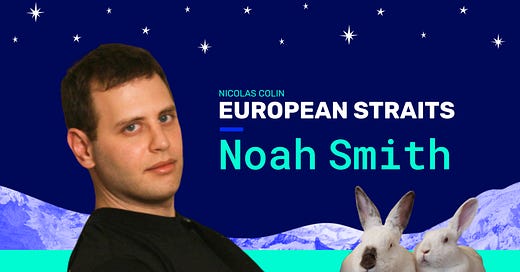

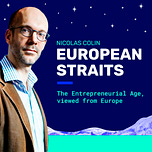









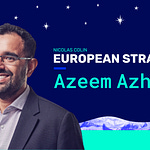
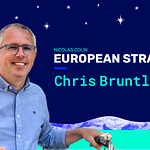
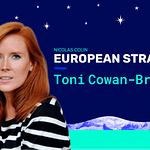
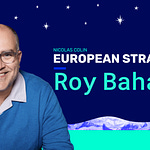
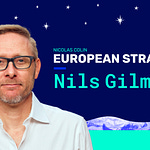
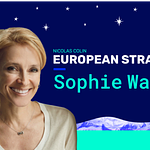
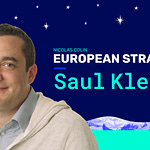
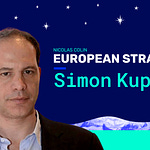
Share this post